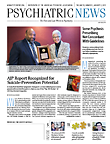Last year was the 50th anniversary of the Civil Rights Act, and this year we mark the 50th anniversary of the Selma to Montgomery March and the Voting Rights Act. The Rev. Dr. Martin Luther King Jr., Rep. John Lewis, and the many individuals who strove to end the dehumanizing legacy of segregation risked and some even lost their lives to obtain equal rights for African Americans as embodied in these and other laws and court decisions. And while these individuals’ courage and strength led to historic legal, economic, political, and moral victories and opened up opportunities long denied to African Americans, we know that the effects of racism are still very much in evidence in numerous overt and covert ways.
As we observe Dr. King’s birthday and contemplate recent events, it is appropriate to renew our commitment to ending the racism and racial discrimination that many African Americans and other people of color experience regularly. A July 2006 position statement by APA states: “Racism and racial discrimination adversely affect mental health by diminishing the victim’s self-image, confidence, and optimal mental functioning.” As psychiatrists, we know that the burden of racism on its victims is real, with significant social, economic, health, and mental health consequences.
Psychiatry is a healing profession. Our special role is to understand the burdens that various factors place upon the brain and mind and the ways in which they lead to illness. We must be aware of the needs in communities where these problems are at the forefront and encourage people to talk about these issues and spread the message that individuals should seek help if they have concerns about depression, anxiety, or feelings of being overwhelmed by recent events or events in their own lives. Moreover, we have a responsibility to ensure that we are skilled in providing care that considers all the circumstances in the lives of our patients and are making diagnoses and choosing treatments based on evidence-based medicine (see page 12).
As Dr. King taught us in his great letter from the Birmingham jail, written on the edges of newspaper and tissue while he was jailed for nonviolent civil disobedience in 1963 in Birmingham, none of us is separate from the community around us, and silence is not an option. Dr. King was counseled to wait, and in his letter he made clear why he could not. Reading his profound, eloquent words from a half century ago makes clearer than any study why we too must take a lead now to foster understanding and healing.
“Perhaps it is easy for those who have never felt the stinging darts of segregation to say, ‘Wait.’ But when you have seen vicious mobs lynch your mothers and fathers at will and drown your sisters and brothers at whim; … when you have to concoct an answer for a five year old son who is asking: ‘Daddy, why do white people treat colored people so mean?’; … when you are harried by day and haunted by night by the fact that you are a Negro, living constantly at tiptoe stance, never quite knowing what to expect next, and are plagued with inner fears and outer resentments; when you are forever fighting a degenerating sense of ‘nobodiness’—then you will understand why we find it difficult to wait.” ■

